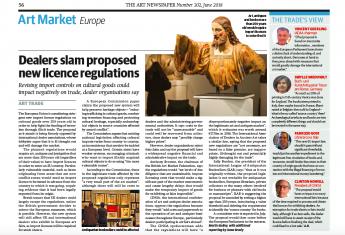Actualités
Dealers slam proposed new licence regulations

The European Union is considering stringent new import licence regulations on cultural goods over 250 years old in order to help fight the funding of terrorism through illicit trade. The proposal as it stands is being fiercely opposed by international dealer associations, whose lobbyists argue that it is ill thought out and will damage the market.
The planned regulations would require art, antiques and antiquities that are more than 250 years old (regardless of their value) to have import licences in order to enter an EU country. Particularly vulnerable material, such as items originating from areas that are now conflict zones, would need an import licence to be issued in advance from the country to which it was going, requiring evidence that it had been legally exported from its origin. Brexit means that UK dealers could largely escape the regulations, unless the British government decides to mirror the European measures, which is possible. However, the new system will still affect UK and international dealers who exhibit in European art fairs, as import licences will be required for stock shown.
A European Commission paper claims the proposed new system will help preserve heritage objects—“reducing tracking in cultural goods, combating terrorism financing and protecting
cultural heritage, especially archaeological objects in source countries affected by armed conflict”.
The Commission argues that existing national legislation affecting cultural imports varies from country to country, an inconsistency that needs to be tackled at a European level. Certain states have weaker systems, encouraging criminals who want to import illicitly acquired cultural objects to do so using “the more vulnerable routes”. According to the Commission, those in the legitimate trade affected by the proposed regulations only represent “a very small part of the art market”, although there will still be costs to dealers and the administering governmental authorities. It says costs to the trade will not be “unreasonable” and could well be recovered from collectors, since dealers may “possibly charge higher prices”. However, dealer organisations reject this claim and say the proposal will have a widespread negative financial and administrative impact on the trade. Anthony Browne, the chairman of the British Art Market Federation, says the regulations would “set levels of due diligence that are unattainable, impose licensing costs that would make a significant part of the market uneconomic and cause lengthy delays that would make the temporary import of goods for exhibiting at fairs impossible”.
CINOA, the international confederation of art and antique dealer associations, opposes the regulations because they would “add costs and paperwork to the operation of art and antiques businesses throughout Europe, particularly dealers participating in art fairs abroad”.
The CINOA spokeswoman adds that the regulations will have “a disproportionately negative impact on the legitimate art and antiques market”, which it estimates was worth around €17.5bn in 2016. The International Association of Dealers in Ancient Art takes a similar line, saying that the proposed new regulations are “not necessary, are based on a false premise, are inappropriate, ill-thought out and potentially highly damaging for the trade”.
Sally Burdon, the president of the International League of Antiquarian Booksellers (ILAB,) says “that as it was originally written, the proposed legislation is not workable for antiquarian booksellers, European librarians, private collectors or the many others involved for business or pleasure with old books or manuscripts”. ILAB is suggesting the proposal be amended by setting a higher age than 250 years, introducing a value threshold and deleting the requirement to identify the ‘source country’ for books.
A committee vote is expected in July. The proposal would then come before the European Parliament in the autumn.
>> This article was first published in The Art Newspaper, Printed Edition June 2018.
It is published here with the permission of the authors and Art Newspaper Editorial, Anna Brady and Martin Bailey.
